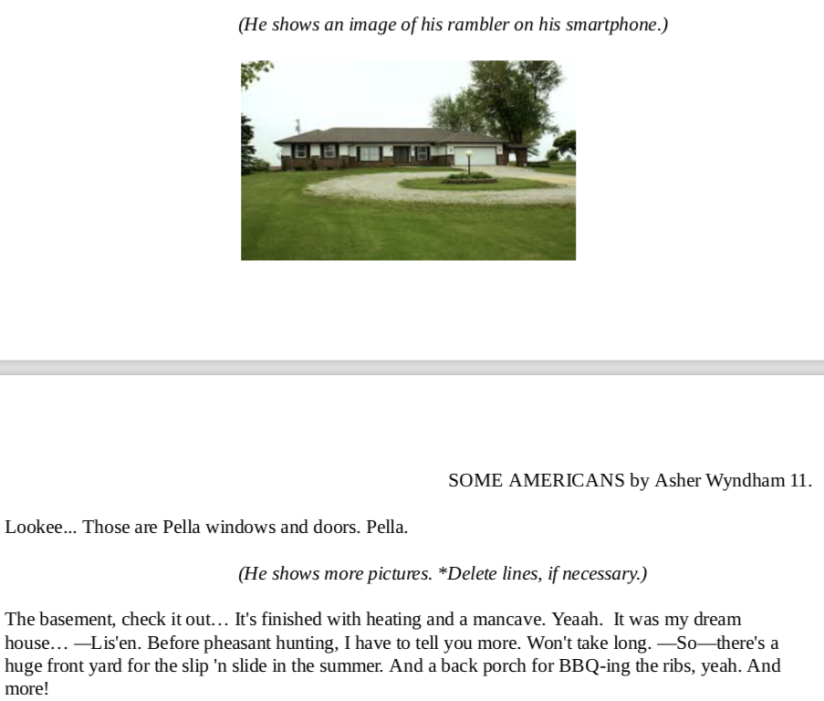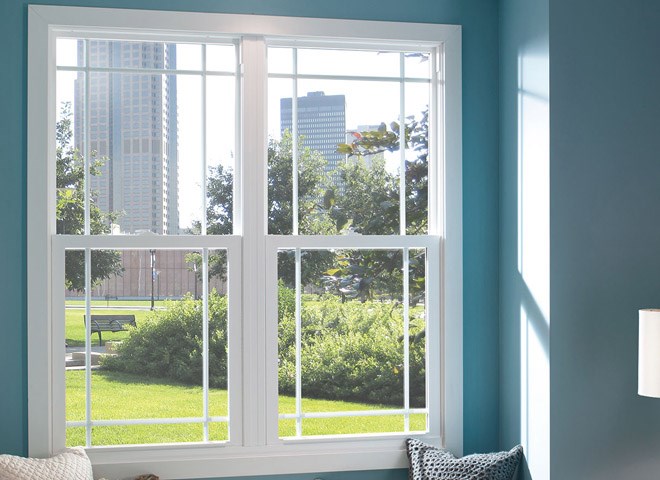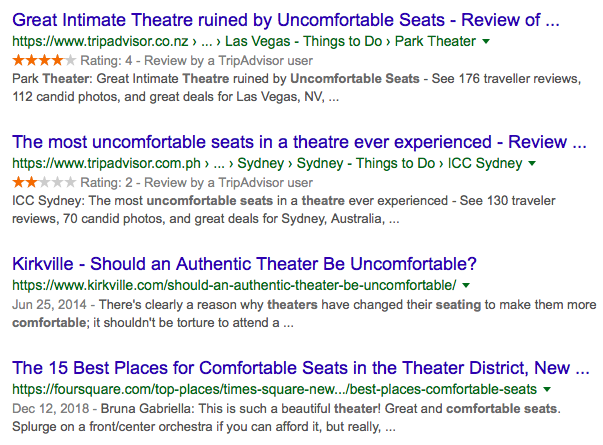Mr. Monologue Man AKA Asher Wyndham is a prolific playwright capable of approaching his craft through a multitude of perspectives.

The first monologue/character of Asher’s we’ll check out is “Barsha Badal” which focuses on an Indian American motel owner. For those readers who haven’t been to the US, Indian Americans own half of the motels in America. A fact that impressed National Geographic so much they wrote an article about it. And the New York Times did like 20 years ago. That writer gets the article title rhyming award for 1999.
But while the NYT and National Geographic suck at writing plays, Mr. Wyndham does not. The monologue details immigrant Barsha’s perspective on her lot in life after living in America.
This monologue starts off with one heckuva BANG:

Niraj is her husband, BTW.
Let’s take this apart for a second. Wyndham just drew a line between a Native American, Sacagawea (who by the way, was purchased by her husband) aka an American Indian and an Indian American. Two Americans connected by location, both physical (the US of A) and grammatical.
The beauty of this exists in the overload of “famous stuff to visit in America” – places that somehow imply greatness, despite the fact that the bigger place they belong to (America) may not be so great. Even Wall Drug is there. Out of that list, only the Black Hills and the Great Salt Lake are worth checking out. Just my opinion, though.
Don’t you just love Barsha’s sense of urgency???? She really goes out of her way to convince herself that life in Nebraska has meaning. And she’s ever-so-patriotic.

As if it weren’t political enough, Wyndham tosses the GOP under the proverbial bus in the form of a fly…and Barsha has already adapted America’s culture of looting food from immigrants (the chimichanga/pudding combo).

If you could not guess the setting, it is here:

I grew up in a somewhere that doubled as a nowhere. Apt description.

Miland is her coincidentally-named son. Between popcorn, daiquiris, Loretta Lynn and Missy Elliott Barsha’s get pop-culture America down, minus a few years and pounds.

I love this postmodern experimentalism Wyndham has going on here. The room numbers look like…room numbers!!!
Again, America and all the culture references: Magnum condoms, dead rats, dogs, marijuana and popcorn. And bloody Shrek.

Finally, the real America shines through Barsha’s self-imposed blinders. Xenophobia is sadly one of those tropes that exist in real-life as well. For depressing news stories about American hatred towards Indians and Indian Americans, look here, here and here.
What can you do to help? Be like Asher. Write something. Make something. Be the change. And be tough like Barsha, once your blinders are removed.
Up next is a similar, yet distinct monologue, FAWZIE, which concerns an Iraqi immigrant who must clean the hotel some evil douchepunk Nazis are having a wankfest convention at. And just who is Fawzie?

PAY ATTENTION TO THE BLACK EYE! It’s gonna come up later.
Fawzie is hosting a fake game show – to herself…
Hmm. Two plays, two dead rats and two condoms and zero G-strings.

BUT this time it’s a grand set up for a brassard/armband/Nazi cosplay regalia… Again Wyndham points out the absurdities of the social sciences and pop culture by reminding everyone Nazi armbands appear in beloved Hollywood musicals.
And the comedy kicks in with the bad restaurant, tomato sauce and food babies. She then explains where she seeks peace: the supply room.

I’ve never thought about Conan O’Brien in a yummy sort of way, but I imagine when it comes time to anoint Conan king make a Conan stamp there should be two like the Elvis stamp.


Don’t worry, not gonna link you to any racist websites. WARNING: I’m not saying that website is racist, I’m just saying racists really like it.
So Fawzie has learned about pudding, Conan and Nazis. Let’s see…

Here is where Wyndham breaks Brechtian and shows us how things should be. Immigrant Iraqi maids should be able to defeat American Nazi hordes.

“Godless ugly men with mini blueberry muffins and mini oranges.” Alright kiddos, that’s Imagery 101 for ya. Fawzie continues her reign of awesomeness:

Let’s digest the above selection (mentally). What can Fawzie teach us???
- Syrup based on stereotypes can still burn Nazis’ eyes.
- America is for everyone (wait, already knew this – more like a review)
- Krav Maga is a very effective martial art. (knew this)
- Fantasy worlds can be interesting as Hell. (review)

Now we know who gave her the black eye. And we also know she interacts with Satan on a personal basis [probably because he’s jealous of her awesomeness] –
And people throw profanity and slurs at her.

God is greater than your hate. Deal with it.
Since we’re dealing with an Iraqi in America, let’s see the cause of her violent removal from her motherland – the whole Iraq War personified by YOUNG VETERAN ADAM AMERSON, whom Wyndham has also chosen to write about.
Young Veteran Adam Amerson aka this guy:

This dude served his country, ruining another country in the process. He’s back home now where he’s trying to sell his home in a limp economy where nobody gives a damn about him. He drinks a bit. “Connie” is the realtor.

“Like tattoos on the eyeballs.” Gotta love it. By the way, that’s a real(ly painful) thing.
Wyndham varies his style between pieces and this is no different, containing some rather fun directions:

And there you have it. The Word of God. 
Did you notice something??? The play comes with visusals/illustrations/enhancers/incredibleness —


Again Wyndham’s characters are turning the American Nightmare upside down and all around on its stupid little head. I weep for the person whose determining factor in buying a home would be plasticized windows. They’re not even stained glass.

Wyndham takes these illustrations to an inventively absurd degree when stuff like this happens:

Yep, the script contains wrinkled children’s drawings of the main character. But it’s not all razzle-dazzle in Amerson’s homefront battle against evil realtors:

He’s gotta go shoot stuff for Thanksgiving.

He spills beer and doesn’t clean it up. Like his style.
Similar to other Wyndham plays, the monologue devolves (or is it “hyper-evolves”?) into a burning indictment of the land of the free graft and home of the brave slave. Check it:

True to his smashing-of-Americana roots, Wyndham references Dr. Suess, Hurricane Gustav, Nazis, Adam Sandler, Netflix , the Klan and even himself.
Wyndham provides a useful glossary:

“Walmart hunters.” Hehe.
Asher’s next monologue is short (and good) enough to post in its entirety. Let’s check it out:


There’s not much I can add here except that if you’re unfamiliar with US politics, what these horrible young lads are saying came right out of our current president’s mouth.
In the play, the school could be America and the dad American men, oblivious to what’s happening to their daughters/mothers/sisters/aunts/coworkers/friends/wives/girlfriends/favorite playwrights.
Let’s see what Asher has next:

Oh this looks exciting! Again, this one we can post in its entirety. Here’s the first bit:

Phoebe isn’t happy.
Now as a little project, let’s illustrate everything pop-culturish that Wyndham throws at us:
-
“Get the selfie stick away from me!”

2.
“I will snap it–and chuck it into the Grand Canyon!”

3. “Y’know, I’m in cheerleading,”

4.
“I’m jacked for a thirteen year-old”

5.
“down, down, down like Wile E. Coyote”
6. “a friggin’ mini blueberry muffin”

8. “I hate outlet malls”

9.
“(I don’t wear Aeropostale or Old Navy anymore)”

For a second I thought it said “find magic IN the Old Navy surplus pants” – does that make me a bad person? We miss Eartha Kitt.
10.
“I hate railway museums (they’re borrring)”
“Traffic’s never bad out here” << because nobody wants to see your national historic site. (As Phoebe would say).
11.
“I don’t want to see Laura Ingalls Wilder house-wagon-whatever,”
There are SIX different Laura Ingalls Wilder houses, take your pick…






I finally got to use the “insert all your pictures at once” function on WordPress.
I wonder if she moved so much because her neighbors got tired of her wholesome stories about her youth. Pictures and article here.
12.
“I’ve seen every friggin’ episode of Little House on the Prairie”
13.
“sucking on a Fudgsicle”

14.
“I’m some Kardashian wannabe in a thong bikini”

15.
“this fake smile doesn’t have to be on Facebook and Instagram every day!”
You know how Thailand is “The Land of Smiles“? Maybe America can be the Land of Fake Smiles.

If you’re reading this, you probably know about Facebook and Instagram.
16.
“You don’t have to take a pic of me in front of Waffle House”

17.
“I will call a lawyer like that celebrity lawyer Gloria Allred and sue your ass for millions!”

From the above, we can see that Wyndham is a master manipulator of American kitsch, pop culture and general Americana, speaking of which we should finish that monologue:

“A boner as big as my forearm”
Yeah, you’re gonna have to go private-browse that one yourselves…
Last but not least, we’ll take a look at a monologue that should stand near and dear in our hearts:

Yes, yes, yes. We all know this person! In fact, we may be this person!!!! (GASP)

Okay, so it’s not me. Whew!!!

Ahh, yes. Theatre, the realm of the cell phone.

Well, the Theatregoer certainly has a valid point on this one.





I didn’t steal your popcorn. Popcorn is disgusting. But the Theatregoer has deeper issues to work out.

And then there’s pulling the wool AWAY from the audience’s eyes and exposing them for the naked, needy and desperate people they apparently are.

Tell ya what, this character will be stuck in whatever comes before “friendzone” – maybe “creepy coworker zone.”
And there you have it, a small sampling of the hundreds of monologues Wyndham has produced.
Asher was kind enough to answer a few questions….
1. How did you start playwriting?
I would say the start, the beginning of my playwriting, happened over a period of time, over two years or so. So I hope the following answers your question…
Playwriting started shortly after I graduated from the University of Sioux Falls, SD. My experiences as an openly gay student facing bullying and dealing with homophobia didn’t give me much confidence after graduation. I was depressed, so one way of dealing with that was escaping reality through reading. I spent much of my time in my bedroom which was also my library. (This personal library wasn’t in Sioux Falls, it was in Arizona.) I started buying more dramatic literature from library book sales — all that you can fit into a grocery bag for a dollar – why not? I would spend hours reading play after play — Ibsen, Pinter, O’Neill, Kushner, all the classics, and one day I started imitating some playwrights by writing plays of various lengths. After almost two years of reading dramatic literature and writing crappy pays, I came across a notice on a library bulletin board advertising a local playwriting group — Old Pueblo Playwrights. Joining that Tucson group, having my work read by other playwrights, learning the craft from professional playwrights, changed my life!
I think playwriting appealed to me in two ways:
(1) It connected me to a community of playwrights and other artists. It gave me a sense of belonging which was difficult to *feel* in a community/city where bullying and homophobia wasn’t a big concern and where you didn’t feel equal.
(2) It was a creative and liberating way for me, mostly through the immediacy and intimacy of the monologue form, to address some personal issues, fears, hopes, anger, dreams, political concerns, questions about Life, Liberty, the Pursuit of Happiness, and the American Dream through voices of different people.
2. What are your influences?
Theatre– The complicated women of Ibsen’s plays have had a profound impact on my writing of my character Allegra in my full length THE PLAYTPODES. Tony Kushner and Luis Valdez continue to remind me that all theatre is political. Caryl Churchill and Suzan Lori-Park’s plays encourage me to think outside the box in respects to structure. The language of Harold Pinter, Tennessee Williams, James Purdy, Suzan-Lori Parks, and Sheila Callaghan have had a profound influence on me. Lanford Wilson, who was a teacher of mine at the Edward Albee New Playwrights Workshop at the University of
Houston, gave me some pointers. Young Jean Lee’s work reminds me to not censor myself and embrace wacky ideas.
Monologue/solo writers such as Danny Hoch, Nilaja Sun, Alan Bennett and Dael Orlandersmith. The monologues written by Donald Margulies, included in his collection MISADVENTURE AND OTHER SHORT PIECES has been one of the biggest influences on my monologue writing. (The monologue Lola is AHMAZING!)
Poems that are really monologues written by Robert Browning and Ai (read her collection Vice). I read Browning in undergraduate college and I was immediately intrigued by the poet using a persona and writing from that character’s perspective.
The multiplicity of voices and perspectives in Chaucer’s Canterbury Tales, the ancient Greek manual on rhetoric Progymnasmata by Theophratus, and Aristotle’s Rhetoric(read that before Poetics).
Playmobil.
Novelists and short story writers that play with text, structure, including pictures, dream maps, doodles, different fonts and font sizes: Ann Quinn, BS Johnson, Donald Barthelme, and Kathy Acker. I like to include pictures and doodles and other artwork into some of my plays. My monologue Young Veteran Adam Amerson includes a large black square and my niece’s doodle.
Overheard conversations at bus stops, coffeehouses, the park, wherever! Every week someone is delivering a monologue for more than two minutes! One time a guy was setting up his drum kit in a park while talking on and on about his girlfriend. Strangers love opening up to me, for some reason, they speak uninterrupted for a long time.
Different ways people of various backgrounds, life experiences, cultures, jobs, regions of the United States use American English. I pay attention to diction, sentence length, fragments, tone, etc. I enjoy learning slang.
3. What is your most memorable production and why?
My most memorable production was the New York City production of my monologue Barsha Badal at Shetler Studios, part of the spork Festival in February 2008, produced
by Theatre 54. It was memorable because of the professionalism of its producers and the incredible collaboration with actor Shetal Shah. It was my first professional production of a one-act monologue, and it’s one of my first monologues ever written (from 2007) and one of my favorites. It was a bare bones production — and a smashing success!
4. What is your least memorable production and why? [you can leave out specifics or names]
If you’re meaning awful production, then I wouldn’t consider it “least memorable.” Even an awful production or certain aspects of a collaboration could be memorable.
A production that I didn’t see? A world famous short play festival chose a ten-minute play. The producer/director emailed me back the Word Doc of my play with changes — text was removed from the play. He cut almost two pages of text. Text was cut to keep it at 10 minutes and the changes came AFTER sound and lighting design were plotted. I can understand suggestions for cutting for time restraints (I am totally open to that!), but to contact me at what seemed like last minute was not OK. The director didn’t want to collaborate. Even if 100s of miles are between the director and the playwright there is still an opportunity to collaborate. I should’ve spoken up, I should’ve said No to some of the changes, but I didn’t know better at the time — I just wanted my play produced at this festival.
4A. Tell us some of your thoughts regarding collaboration?
One of my earliest experiences with a large group of artists could’ve been more intense. Maybe budget and time constraint resulted in the type of collaboration.” And then after that “Some questions that I had after the collaboration:
Some questions that I asked myself after the production:
How does a playwright collaborate with a prop designer? (That would also include the director!)
How does a playwright collaborate with a lighting designer?
…media designer?
…fight choreographer?
…the person in charge of making the trailer?
…costume designer?
…make-up designer? etc.
What is the beginning, middle, and end to these collaborations?
Where does it happen in the schedule of a production?
What questions, what kind of conversation is possible before first rehearsal?
Are these types of collaborations lacking in some theatres, in college theatre?
Are there study cases, for example, of collaboration between media designers and playwrights?
How can such intense collaborations influence new play development and production?
5. What is your funniest theatre story?
During a production of Heartbreak House by Bernard Shaw there wasn’t enough little slices of lemon poppy-seed cake. Because they were eaten. By me. I was a co-stage manager and I got the munchies. That is a long-ass play. That was the last time I stage managed a play.
6. What are your writing habits like?
I usually write something every day, sometimes a page, sometimes just a few words, sometimes after work until I go to bed.
Usually on Sunday, I wake up with an idea for a monologue or voice of a character in my head and write five to ten pages of a first draft.
I scribble down ideas for monologues on scraps of paper and fold them up and add them to a baseball cap. I select a scrap of paper from the cap and attempt to write the monologue.
I “perform” my monologues. Because for me playwriting, especially monologue writing, is a performative art — it involves the ENTIRE body — the lungs, the legs, the arms, the ass, the ears, etc. — and moving around, crawling, jumping, dancing, etc. Each draft involves me getting on my feet, inhabiting the character, attempting to become this other person in my kitchen or on my living room floor. I am not an actor, I’ve never been trained, I can’t remember many lines — so I basically read a few lines from my computer and act it out, and then move to another section. Sometimes I speak for five or ten-minutes to myself (don’t care if anyone hears me) and then after that try to write down what I remember saying.
7. What advice do you have for new playwrights?
Read not just plays: read comic books, philosophy, poetry, novels, short stories from different cultures and viewpoints, message boards, blogs, read from multiple sources of news.
Join New Play Exchange NOW — it will change your life!
Attend play conferences. (If you don’t have the $$$ like me right now, then get your plays read.)
Get out of your pajamas and stop eating cereal three times a day.
Be a fucking amazing human being. Introduce yourself to strangers, go to art galleries, dance until 530 am with beautiful people.
Create art that uses various facets of your personality.
If it seems like a stupid idea for a play, a silly or sick or weird idea for a play — write it! Don’t censor yourself!
8. Who are some other writers you should get more attention?
Ricardo Soltero-Brown, Rachael Carnes, Nelson Diaz-Marcano, Matthew Weaver, Jordan Elizabeth Henry, to name a few.
9. What are common themes in your work?
I generally write from the perspective of people that are marginalized, on the periphery , “othered” in some way. The underdog, those that are disillusioned. The oppressed, the bullied, the misunderstood, the fuck-ups. From their individual perspective, from their need to be heard, from their anger, their dreams and desires, I deal with many themes — the illusion of the American Dream, the difficulty of remaining hopeful, the desire for acceptance and belonging, confronting and questioning traditions/values/beliefs/status quo/history/people in power.
10. What is one thing you wished you knew now, that you didn’t know starting out?
I don’t have an answer for that.
11. Why did you decide to focus on monologues?
That’s a great question! The more I think about this question, the more I want to add to this. For now, here’s why I love writing monologues.
I love the challenge of entertaining an audience for one to 25 minutes with one person on stage.
I want to challenge the thought that many have that monologues are anti-theatre, not dramatic. Some may disagree with me, but I think monologues — or solo plays — are one of the most misunderstood forms of American theatre. Many theatres do not want playwrights to submit monologues, many theatres do not produce them as part of their season. I want to help change that, I want to get theatres to think differently about the monologue after reading my work, even if it takes me decades.
I love that monologues, if it’s direct address to the audience, break the fourth wall. The character/speaker of a monologue creates an intimacy, an immediate connection with the audience. Sometimes audience becomes a “stage audience” as opposed to a “theatre audience”: they are part of the world of the play, imagining themselves as a group of people or a character that the character/speaker is addressing. There’s so much in our culture that alienates us from one another, and theatre helps to create an intimacy between different kind of people, a sort of radical empathy happens — and the monologue form, I think, does it better than plays with more than one character.
I am trying to master the monologue form in a way that is an opposition of what I read in book form and see on stage. Many monologues, especially those in audition books, do not excite me. They are not active, there’s no objective, there’s no reason for the character to speak, I am left wondering after the reading, “Why is this character speaking to me?”
I disagree completely with Alan Bennett when he says in his Introduction to The Complete Talking Heads: “The more still (and even static) the speaker is the better the monologue works.” Hogwash! My monologue characters make use of the stage, they do more than just sitting. They’re dancing, jumping, crawling, throwing props. My monologues use a language that is a language of the body. If the audience understands why the character is speaking to them, then there’s no reason to have a static speaker!
I enjoy the challenge of structuring a monologue just like a play with more than one character. But I am also experimenting with structure, so I am not always adhering to Aristotelian structure.
I enjoy the challenge of writing from perspective of people who are not like me. Other playwrights have remarked about my ability to write from the perspective of practically anyone — that is one of my goals. I approach each monologue differently in respects to language.
Monologue writing gets me out of pajamas. It immerses me in my community, gets me in contact with people from different backgrounds, cultures, ages, etc. Are my monologues authentic, accurate, honest representations? To insure that, I need to collaborate with diverse actors and artists.
Monologue writing gives me an opportunity to share my frustrations, hopes, and desires, to question certain perspectives/ideologies, to deal with social issues and problems, to address what it means to be a citizen — through a character that doesn’t shut up!
12. Can you please tell us about the evolution of Barsha Badal, from idea to where it’s at now?
It is one of my earliest monologues, and one of my favorites. I recommend that as a starting point for people new to my work.
It began with an image, as do most of my monologues — a woman leaving a motel room in Tucson, AZ. The woman sighed while holding a heavy load in a laundry basket. With that image, I wrote the one-act monologue in 2007 with that woman being the motel owner in nowhere, Nebraska. Shortly after writing it was staged read by an Indian-American actor in Tucson, and then about a few months later it was professionally produced with an Indian-American actor in New York City, directed by me. With that actor’s feedback, a few tweaks were made to make it accurate. In the fall of 2007 it was read one night to some Indian theatre artists that ran a theatre company, and another night it went up in Washington DC. Over the years, staying in motels, I’ve made observations and they’ve made it into the play. Ever since my focus on submitting my first volume of monologue, SOME AMERICANS: SOME MONOLOGUES, to publishers, I’ve been revising it, tweaking it. That started shortly before Trump got in. After watching news reports about the rise in hate attacks and Neo-Nazism in the U.S., I
knew I needed to dust this monologue off and approach it from a different perspective. After watching videos of the riot in Charlottesville, VA I decided to add the part about Barsha going for a walk for coffee creamer and her encounter with some Nazi-wannabe teenagers.
13. What is the relationship between American pop culture and your writing?
Have you seen that Lady Gaga video — Poker Face — with those glasses that read POP CULTURE –? I love pop culture! It has a tremendous impact on my writing. I am not just a citizen, I am a consumer–and so are my characters. Blogs, Instagram, dating apps, comment threads, pop music, products in a superstore, trashy magazines, posts, you name it — it may influence a play. IDGAF if it’s considered low-brow or crass or trashy.
Sometimes the character determines what kind of pop culture inspires me during writing and revising. Sometimes pop culture inspires a character.
I don’t understand the criticism by theatre artists against the use of pop culture in a play. I think such a response is elitist. A few times I have been in a room with some playwrights that encouraged me to not make pop references. I have had a director try to persuade me to remove all my pop references — no M&Ms. Tony Kushner mentioned Burger King in Angels in America, hello. Some have argued that pop culture references dates the play, makes it less universal. Yes it dates the play, but it can still be universal. I let pop culture influence my plays as much as the philosophy of Kierkgaard, a novel, or a poem.
14. So many of your monologues focus on the “other” – minorities, immigrants, poor people, differently-abled, elderly, etc. How can American theatre be more open and welcoming?
Produce less Broadway or off-Broadway plays that do not speak to a variety of audiences.
Produce plays with cheaper ticket prices or Pay-What-You-Can so that people other than rich white old people can see the plays.
Making sure that at least 50 percent of your people involved in a show (that includes crew, cast and other artists) are minority. If you’re a person that donates money, demand change or stop giving the theatre money!
Theatres need to do the fucking work and connect with communities/peoples unlike those on the board. If you’re not producing work that mirrors a diverse America, WTF?
Maybe theatres should not be funded by grants if a certain percentage of plays are not written by a minority playwright or produced with minority artists. Maybe those interested advocating for minority voices in theatre should contact people in local government.
15. What’s a question you’d like to be asked? Go ahead and answer that question.
What are your top ten monologues on New Play Exchange that you recommend for reading and production?
Barsha Badal, Young Veteran Adam Amerson, Valerie, Don Ponzo!!!, Manny Aquino, Fawzie: A Hotel Chambermaid Monologue, Janey Smith: A Football Fan Monologue, Renata: A Post-Maternity Monologue, Sandy: A Supercenter Monologue, and Fuck Buddy.
Thanks Asher for sharing your talent and insight!!!
For our other playwrights, click here.
Here are couple links for people to keep up with him:
New Play Exchange page.


